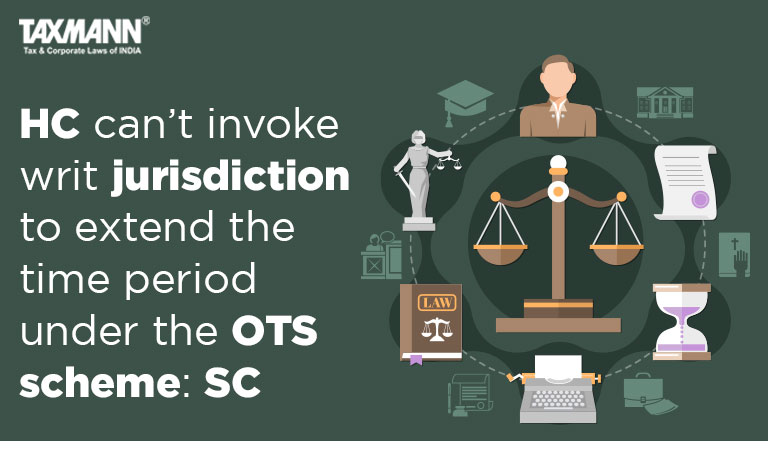HC can’t invoke writ jurisdiction to extend the time period under the OTS scheme: SC
- Blog|News|FEMA & Banking|
- 2 Min Read
- By Taxmann
- |
- Last Updated on 9 November, 2022

Case Details: State Bank of India v. Arvindra Electronics (P.) Ltd. - [2022] 144 taxmann.com 140 (SC)
Judiciary and Counsel Details
-
- M.R. Shah & Krishna Murari, JJ.
Facts of the Case
In the instant case, an appeal was filed by the appellant against the order passed by the High Court of Punjab and Haryana under Article 226 of the Constitution of India to the original writ petitioner to make the payment of the balance amount (Rs.2.02 crores with interest) as per the sanctioned letter of OTS dated 21.09.2017.
The appellant had sanctioned a cash credit in favour of the respondent. Later, the account of the borrower was classified as NPA in 2015. The Bank came out with one-time settlement (hereinafter referred to as ‘OTS Scheme’) dated 01.09.2017. The Bank sent an OTS offer to the borrower for OTS and the ledger outstanding as of 31.03.2017. The borrower accepted the OTS offer and deposited an amount of Rs.1.40 crores with the Bank on 31.10.2017.
In the sanctioned letter dated 21-11-2017 it was specifically mentioned in Clause (iv) that the entire payment under the OTS Scheme was to be made by 21-5-2018. Otherwise, OTS would be rendered infructuous. Therefore, borrowers were bound to make the payment as per the sanctioned OTS Scheme.
Later, the Bank arbitrarily and without just cause or explanation rejected the respondent’s request for extension while extending the benefit of extension of OTS to other borrowers the Bank arbitrarily and without just cause or explanation rejected the respondent’s request for extension while extending the benefit of extension of OTS to other borrowers.
It was submitted by the learned Advocate appearing on behalf of the respondent that the High Court has rightly observed that the decision of this Hon’ble Court in an earlier judgement was distinguishable since it deals with the issue of grant of OTS and not an extension of time once OTS has already been granted and acted upon by the parties.
Further, it was submitted by the learned counsel appearing on behalf of the Bank that the Hon’ble High Court, under Article 226 of the Constitution of India, cannot direct reschedule the payment under the OTS as it amounts to modification of the contract, which can be done by mutual consent under Section 62 of the Indian Contract Act.
High Court Held
Hon’ble High Court believed that directing the Bank to reschedule the payment under OTS would be tantamount to modification of the contract, which can be done by mutual consent under Section 62 of the Indian Contract Act.
High Court held that by the impugned judgment and order rescheduling the payment under the OTS Scheme and granting an extension of time would be tantamount to rewriting the contract, which is not permissible while exercising the powers under Article 226 of the Constitution of India.
Disclaimer: The content/information published on the website is only for general information of the user and shall not be construed as legal advice. While the Taxmann has exercised reasonable efforts to ensure the veracity of information/content published, Taxmann shall be under no liability in any manner whatsoever for incorrect information, if any.

Taxmann Publications has a dedicated in-house Research & Editorial Team. This team consists of a team of Chartered Accountants, Company Secretaries, and Lawyers. This team works under the guidance and supervision of editor-in-chief Mr Rakesh Bhargava.
The Research and Editorial Team is responsible for developing reliable and accurate content for the readers. The team follows the six-sigma approach to achieve the benchmark of zero error in its publications and research platforms. The team ensures that the following publication guidelines are thoroughly followed while developing the content:
- The statutory material is obtained only from the authorized and reliable sources
- All the latest developments in the judicial and legislative fields are covered
- Prepare the analytical write-ups on current, controversial, and important issues to help the readers to understand the concept and its implications
- Every content published by Taxmann is complete, accurate and lucid
- All evidence-based statements are supported with proper reference to Section, Circular No., Notification No. or citations
- The golden rules of grammar, style and consistency are thoroughly followed
- Font and size that’s easy to read and remain consistent across all imprint and digital publications are applied



 CA | CS | CMA
CA | CS | CMA
